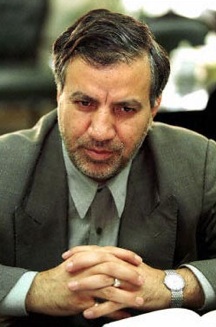
Ataollah Mohajerani’s political career began in 1980 when he entered the Islamic Republic’s first Majlis as a representative from Shiraz as its youngest member. He served as the deputy for parliamentary affairs under Prime Minister Mir Hossein Mousavi and later under President Akbar Hashemi Rafsanjani.
Mohajerani is best known for his tenure as Minister of Culture and Islamic Guidance during Mohammad Khatami’s reform-minded presidency. His official policy of “leniency” ushered in Iran’s cultural renaissance in 1997, which initially saw an explosion of free press and arts in the country. His liberal policies won him many enemies; he survived an impeachment by the conservative-dominated 5th Majlis, but eventually sent a 50-page letter of resignation to Ayatollah Khamenei and stepped down in April 2000.
Mohajerani currently lives in London with his wife Dr. Jamileh Kadivar, a former parliamentarian, and maintains a personal weblog at www.maktoub.ir.
In Iran’s 2009 presidential election, the ex-Ershad chief backed Reformist candidate Mehdi Karroubi. He is now a vocal supporter of the pro-democracy Green Movement, a cause he promoted this week at a high-profile conference at the Washington Institute for Near East Policy (WINEP), a conservative DC-based think tank.
Dr. Ataollah Mohajerani (‘Ata’ to intimates), a famously polished speaker, thwarted impeachment when serving as Mohammad Khatami’s Culture Minister by virtue of an eloquent defense to Majlis. His talk on “The Future of the Green Movement” to a packed audience of Iranian diaspora Monday night at Montgomery College in Virginia, true to form, was laced with philosophic references and poetry.
Yet Mohajerani did not mince words when it came to the nuts-and-bolts questions facing the opposition movement in Iran’s ongoing internal crisis.
He began by cautioning against haste and expectations for fast results. “The Green Movement is an opportunity for the Iranian people to define themselves on their own terms. The process requires time — it’s not a sprint, but a marathon.”
He warned that any act toward radicalization would spell “the death of the Green Movement,” and stressed the need to preserve its non-violent nature. “The age of armed resistance is passé, unless you’re al-Qaeda,” he said. “If we answer violence with violence, we are no different from them [the government].”
The veteran Reformist named Mir Hossein Mousavi, Mehdi Karroubi, and Mohammad Khatami as the political leaders at the helm of the movement. He said that while a multitude of demands had escalated after June’s fraudulent election, the original goal of the post-election protests is the “national” banner under which the movement should unite, in order to avoid becoming divided and ineffective. “We must move together in an organized and cohesive manner, just as birds trapped in a net will be able to lift off only when they all fly in one direction.”
He next expounded on this ‘original goal’ of the Green Movement, adding that a ‘second goal’ had emerged in the wake of the government’s brutal response to protests.
The foremost demand, Mohajerani said, centers on the signature question “Where is my vote?” — a phrase “coined by the country’s youth” to “denounce the [Ahmadinejad] government as illegitimate.”
“Those who orchestrated the vote fraud imagined that society would show no reaction if faced with a fait accompli. But in fact, they are now unable to manage the country.”
The former parliament deputy went on to say that Majlis, the Iranian parliament, can help end the country’s political deadlock by voting to impeach Ahmadinejad on grounds of being unfit to head an administration [adam-e kefayat] and lack of legitimacy [adam-e mashruiyat].
He added that the Iranian public must keep up efforts of staging anti-government protests on calendar occasions, as has been the trend thus far. He also encouraged artists not to attend award ceremonies, as a way of refusing to recognize the government.
But the Green Movement doesn’t stop at Ahmadinejad, Mohajerani told his audience. In light of the state-sponsored violence, jailing, detainee torture, and show trials that met protesters who were exercising their “constitutional right to free assembly,” the top authority in charge of the country must also be impeached.
“The Leader is responsible for these events. This word comes from “responding” to questions. He must answer to what has happened in Iran. Just as he ordered the closure of Kahrizak [detention center], he could have stopped these other terrible incidents.”
“The Assembly of Experts has a duty to weigh in on the role of the Supreme Leader and hold him accountable. If it fails to do so, the Experts will have deviated from their primary function.”
Although Mousavi and others opposition leaders had previously hinted in various statements at the involvement of the man at the top of the Islamic Republic, Ayatollah Ali Khamenei, in the so-termed ‘electoral coup,’ they had never directly called for his removal (to do so, while living in Iran, would be tantamount to suicide). Grand Ayatollah Ali Montazeri, Iran’s top Shia theologian, issued a fatwa declaring Khamenei’s rule as Supreme Leader illegitimate.
Mohajerani pointed out that both these demands — the impeachment of Ahmadinejad by Majlis and Khamenei by the Assembly of Experts — are “within the framework of the constitution.”
The former Culture Minister ended his speech by emphasizing that the Green Movement is a “national and independent” movement that does not need “support” from the United States or other external forces.
It was interesting to watch a former Islamic Republic official, who still looked and sounded like one, addressing a roomful of Iranians — the women were hejab-less and the men in ties — on a visit to the capital of the United States (to speak at the Washington Institute, no less).
First published in Frontline/Tehran Bureau.






